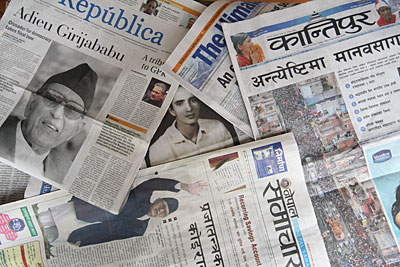 |
The good atheist that he was, Girija Prasad Koirala was sceptical of religious explanations about the cycle of life and death. This life was real for him, anything before and after mere speculation. He took life as it came and tried to make the best use of every opportunity to pursue the goal he believed in: democracy is a sine qua non for a dignified life and an honourable death.
Dignity was repeatedly denied to GP while he was alive. Ridiculed and reviled by disgruntled supporters and envious opponents alike, he learnt to build a platform from the bricks thrown at him. When he was finally put on a pedestal two years ago, having successfully conducted the Constituent Assembly elections, heroes and villains alike appeared Lilliputian in the shadow of his towering presence. That could have been why the Nepali media gave unprecedented coverage to his death.
Compared to the hysteria at the passing of Ganesh Man Singh or the desperation in the wake of the Narayanhiti Massacre, the mourners at GP's funeral were remarkably restrained. Some UML politicos were observed cracking jokes at Aryaghat, but the Nepali media as a whole chose to focus upon the trials and tribulations of GP's remarkable life.
The Nepali media is still facing a steep learning curve, however, as the quality of coverage indicated. This may have had something to do with the choice of the national stadium for the beginning of the funeral cort�ge, but television channels turned the moment of grief into a spectacle. The cameras zoomed in on the jovial faces of leaders assembled at Aryaghat. The passing of an octogenarian is often an occasion to celebrate in the Hindu religion, but here it just looked jarring and disrespectful.
The NC troika accompanying GP's hearse marred the solemnity of the occasion by waving at the crowds, but radio commentators made it even worse by focusing upon the unhealthy competition for the leadership likely to ensue in the party. Deliberations upon the legacy of the departed leader would have been more appropriate.
The print media displayed more maturity. The tabloid Naya Patrika came up with a better obituary package than the broadsheet dailies on the day of the cremation. When this was pointed out, a journalist at a rival daily commented that it might have been so because Naya Patrika had been working on the story for quite some time. This is hardly a surprise � what was surprising perhaps was how difficult it was to find a balance of accurate, lively, and memorable information about GP's life, despite the press doing his death to, well, death.
The Indian media refrained from sensationalising the passing of the architect of the peace process but gave the subsequent mourning prominence.
The Hindustan Times, the Times of India and the Deccan Herald editorialised about the possible consequences of GP's departure from Nepali politics. Indrani Bagchi, an advocate of a Hindu monarchy for Nepal, wrote a long piece in the Times of India urging her government to back the UML-led government to the hilt. Even well-known GP-baiter Yubaraj Ghimire wrote a critique in the Indian Express confessing reluctant admiration for the man he has loved to hate for years.
Obituaries on the Internet, or rather the comments that followed, were expectedly the most virulent. For all his commitment to peace and democracy, GP was clearly not a popular person in the hate-filled world of cyber-warriors. But then comments in cyberspace are ephemeral, with little or no impact upon grassroots politics in Nepal.
GP would have smiled had he been told of the things being said about him in cyberspace, and might have commented wryly, "They write without grasping the meaning and significance of any event." Perhaps that is true for most of what we do in the Nepali media even today.
READ ALSO:
The golden middle - FROM ISSUE #495 (26 MARCH 2010 - 01 APRIL 2010)
Real democracy - FROM ISSUE #495 (26 MARCH 2010 - 01 APRIL 2010)
THE MORNING AFTER - FROM ISSUE #495 (26 MARCH 2010 - 01 APRIL 2010)
Political vacuum - FROM ISSUE #495 (26 MARCH 2010 - 01 APRIL 2010)
Death of the guardian - FROM ISSUE #495 (26 MARCH 2010 - 01 APRIL 2010)
Political being - FROM ISSUE #495 (26 MARCH 2010 - 01 APRIL 2010)
Post-GP - FROM ISSUE #495 (26 MARCH 2010 - 01 APRIL 2010)



